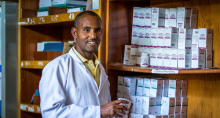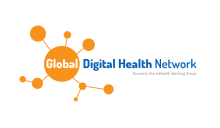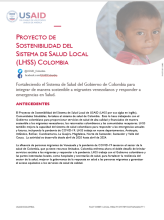Learning and knowledge sharing are fundamental to the LHSS Project. We invite you to search LHSS knowledge products and resources for the latest approaches, insights, and learning in the field of integrated health systems strengthening.
2022 marked Vietnam's 10-year journey to sustain its HIV response with domestic financing (2013 – 2022). The country now stands out as a global example for sustainability and domestic resource mobilization for its HIV program.
This video was followed by a presentation from USAID’s M-RITE project and several sessions on the breadth and depth of the LHSS Activity’s interventions.
The Russian invasion of Ukraine has caused many doctors to leave the country, compromised patients’ safety when seeking care, and displaced large portions of the population away from their primary health care providers. A strong national telemedicine system will be key to assuring access to health services for Ukrainians, now and in the future. Experiences from other conflict/disaster areas may provide insights, helping Ukraine assess and implement its own telemedicine response.
This assessment of the tele-counseling services provides valuable information that should be used as an input by the MSPS for the decision-making processes related to the technical guidance that will be issued to organize the implementation of this strategy at the local level.
LHSS supported the MSPS to develop guidelines and recommendations not only for the provision of care, but also for rehabilitation and for health workers’ occupational safety and health. Once the protocols are adopted by administrative act, the MSPS will be responsible for the dissemination process. LHSS Colombia, as part of its transition plan, will be ready to support the process of disseminating the protocols to human resources for health working at the basic level of care in the prioritized territories.
This document identifies several scenarios for sustaining the use of Mi Paciente for monitoring ARI/COVID-19 patients, considering the socio-economic conditions of each territory.

USAID LHSS Project and MTaPS program collaborated to draft and pilot a resource to help countries increase the accuracy of their pharmaceutical expenditure data.

With a grant from LHSS, the Jamaican health care firm Online Medics is supporting the government’s COVID-19 vaccination effort while gaining valuable new business capacities. “LHSS allowed me to think in the long term – where I wanted my company to go and what I need to do to get it there,” says owner Alex Tracey.
This brief includes a set of suggested competencies developed in collaboration with a diverse group of stakeholders from around the world who identified them as essential for the health workforce.
Photo essay presented at the 7th Global Symposium on Health Systems Research, November 2022.
This report synthesizes learning from an in-depth examination of successful MOH efforts that have led to increased health budget execution. It offers a vision of good health budget execution, as well as promising practices in the areas of budget structure and processes and budget accountability.

LHSS is proud to present at the Global Digital Health Forum, December 5-7, 2022, in Arlington, Virginia.
This technical guidance document provides a summary of principal findings that highlight those complex factors including a literature review, surveys, resource mapping, case studies including key informant interviews, and the development of a theory of change.
This literature review seeks to identify, analyze, and document successful efforts to integrate Social Determinants of Health into health workforce education, training, and service delivery in low- and middle-income countries.

